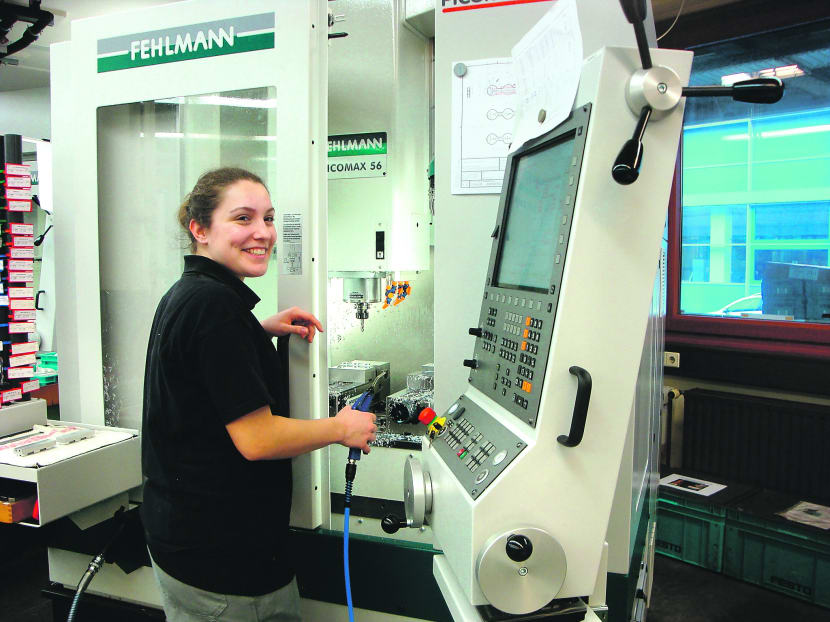Committee suggests bigger role for S’pore firms in vocational education
MUNICH (Germany) — Companies in Singapore have to do more to shape the curriculum for vocational education and to train students for the workforce.

Automation technology apprentice Anna-Lena Kaizes tried out working in different departments and was mentored by an employee in German firm Festo. Photo: Ng Jing Yng
MUNICH (Germany) — Companies in Singapore have to do more to shape the curriculum for vocational education and to train students for the workforce.
That is the call from members of a committee that has been given the task of reviewing the Institute of Technical Education (ITE) and polytechnic systems.
The Applied Study in Polytechnics and ITE Review (ASPIRE) committee, which concluded over the weekend a five-day study trip to Switzerland and Germany to learn from their integrated work-study models, also saw the need for early career guidance to help students discover their interests and understand prospects in the vocational education track.
Speaking to the Singapore media at the end of the trip, Senior Minister of State (Education and Law) Indranee Rajah — who chairs the ASPIRE committee — pointed out that, in Singapore, it is the schools’ responsibility to prepare students for the workforce, but in Germany and Switzerland, companies see this as a partnership with schools.
Other members of the ASPIRE committee reiterated that Singapore companies had to move away from playing a supportive role to one where they took greater ownership of vocational training in ITE and the polytechnics.
Committee member Tan Choon Shian, who is also the Principal of Singapore Polytechnic, said: “(Under) today’s model, the (education institutes) take the lead and the industry supports ... We have to evolve to a model where there is co-leadership and co-ownership of the curriculum and students.”
In Germany, for instance, companies have staff dedicated to overseeing apprenticeship programmes. Assigned mentors provide regular feedback on students’ performance and customise training plans for individual students.
Ms Indranee noted the need to help employers see the value of getting involved. Among other things, it could provide a means of producing skilled apprentices to fulfil job roles, she said. Nevertheless, she added that unlike in Germany and Switzerland, where companies take the lead in vocational education, Singapore would require a more collaborative model with Government intervention because industry players are still adapting to playing an educational role.
Representatives from Cisco Systems and Sakae Holdings, who were on the study trip as part of the committee, said they were open to the idea of greater industry involvement. However, they pointed out that the partnership with schools had to be adapted to Singapore’s context.
The committee also observed a positive mindset towards vocational learning among German and Swiss youth. Referring to the Swiss system, where pupils can access professional career counselling services, Ms Indranee said: “If we don’t really know the options, don’t know what the job scene is like (in the future), then you will stick with the tried and true.”
Still, she cautioned against placing students prematurely on a particular track. German students, for example, are streamed into the vocational track in Primary 4. Instead, providing early career guidance would enable students to identify their interests and strengths while leaving room for them to experiment, she said.
The Singapore Workforce Development Agency Chief Executive Ng Cher Pong, who is also a committee member, noted that the Swiss and German apprentices are aware about their career progression pathways.
For Singapore, it could be worth studying how to enhance the clarity of these pathways, as Singaporeans are more familiar with the academic routes, he said.
In Germany and Switzerland, more than 60 per cent of each cohort opts for vocational education. Ms Indranee acknowledged that the positive response was due to the fact that these students are able to pursue higher education eventually, regardless of the educational path they have chosen. More could be done in Singapore in this aspect, such as looking into funding individuals to seek professional certification after they started work, or incentivising companies to send their employees for upgrading courses, she said.
Next month, the ASPIRE committee will visit Australia and New Zealand to study how students are trained for services sectors such as healthcare and childcare. The committee is expected to present its recommendations in the second half of the year.






